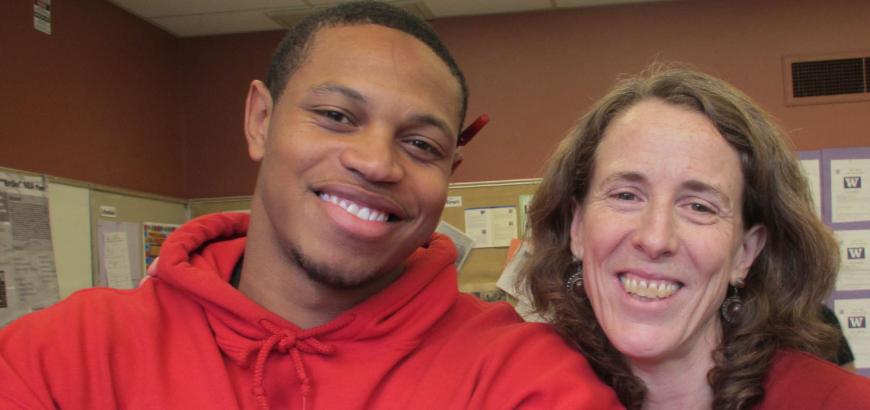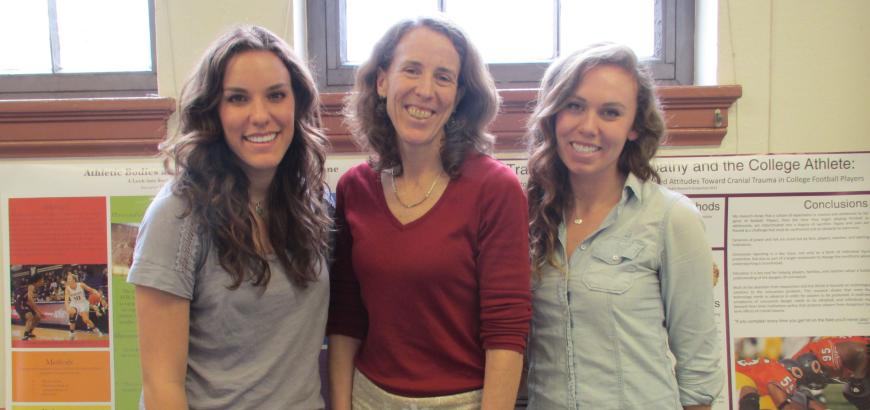Congratulations to Holly Barker, Lecturer in Anthropology, winner of the University of Washington 2013 Distinguished Teaching Award! This award is given to only a few faculty members each year.
Since 1988, when Holly first went to the Republic of the Marshall Islands (RMI) as a Peace Corps volunteer, she has spent much of her life working with Marshallese people both in Micronesia and the United States. Her research focuses on the history of the U.S. nuclear testing program in the RMI and the serious ongoing health and environmental problems affecting Marshallese as a result of the testing. With great compassion and humility she teaches—and has written two books—about the unjust policies carried out by the United States. Her work vividly describes the devastating consequences of the nuclear testing, the creative and determined work of the Marshallese for political recognition and self-determination, and the contributions that anthropological research has made and can continue to make to these efforts.
Holly teaches a wide variety of courses, all of which have social justice as the driving intellectual force. These include The Culture of the Bomb; The Cold War; Colonialism and Culture; Environmental Health and Public Policy; The Discourse of Climate Change; Public Policy and Education; Cultures and Politics of Environmental Justice; Research Methods; Collaborative Research; and Anthropology and Sport.
It is evident to those of us who know her why Holly won the teaching award. Her teaching evaluations, which routinely receive straight 5.0 scores, are by far the highest in the department. But numbers alone do not convey the love her students feel for her. Their comments on her course evaluations consistently attest to the tremendous impact she has on transforming their lives. “Holly makes anthropology relevant,” “Holly’s course has taught me how to use what I learn,” and “Holly cultivates classrooms of people that are more than just classmates; she fosters the development of communities where people genuinely care about each other.”
Holly makes a concerted effort to reach a wide variety of learners by attending to individual students regardless of where they are in their educational journey. She strives to make academic research accessible to everyone and designs her courses to give students a range of formats to communicate their understanding of concepts. In this way, each student can achieve academic success. She also creates collaborative working environments to bolster a sense of community and reduce students’ feelings of isolation.
Most importantly, Holly makes whatever she teaches meaningful to students’ lives by getting them engaged in active learning by putting their skills to use in the community. All of her courses include a service-learning component. Examples include working with seniors at the Pike Place Market for a course on Research Methods, or forming a partnership with the State’s Department of Ecology for a course on Environmental Health and Public Policy. For this course, students toured the Hanford site. For their main assignment, they created projects that addressed the surprising absence of Hanford in the public discourse, and raised the public’s awareness of the environmental health issues motivating clean up efforts.
As one student commented, “It’s one thing to look at theory and discuss educational disparity, but to have the ability, especially through service learning, to apply the knowledge and to effect change was transformational. Lessons from Holly’s class will carry into the rest of my life. Holly’s obvious dedication to educating her students and pushing them to succeed was empowering and motivating.”
Not only do the students thank Holly, but the Department of Anthropology also thanks her for adding such passion, commitment, and integrity to our program, which enriches all of our lives.

